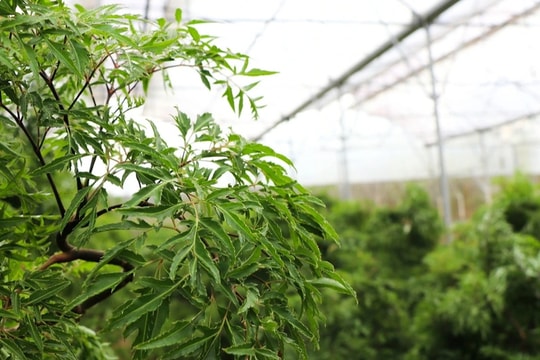The ornamental plant is known as 'poor man's ginseng'
Polyscias fruticosa is also known as fish salad plant because people eat the leaves with fish salad. Some studies show that Polyscias fruticosa has the effect of increasing the body's endurance, similar to ginseng.
According to specialist doctor Huynh Tan Vu, University of Medicine and Pharmacy Hospital, Ho Chi Minh City, branch 3, ginseng is considered "ginseng of the poor". Ginseng leaves are not only used as raw vegetables but also as a medicine that has the effect of improving health and curing many diseases.
Doctor Vu said that ginseng is also called fish salad plant because people often use the leaves to eat fish salad, the leaves have a fragrant smell. This type of plant is commonly grown as an ornamental plant throughout Vietnam, and also grows in Laos and China.
The chemical composition of ginseng includes alkaloids, glucosides, saponins, flavonoids, tannins, vitamin B, amino acids such as lysine and methionine...
In daily life, in addition to its use in fish salad, ginseng is also used to treat coughs, coughing up blood, promote urination, promote lactation, and severe dysentery. In India, ginseng is used to treat fever and tighten the skin.
Doctor Vu said that ginseng can be used in some medicines to treat fatigue, lethargy; clear milk ducts; treat muscle and joint pain, wounds; prevent convulsions in children; treat allergies, measles, coughs, dysentery, etc. However, using ginseng root in high doses will cause drug intoxication and fatigue, vomiting, and diarrhea.
In 1961, research by the Departments of Pharmacology, Medicinal Materials and Pathological Anatomy of the Vietnam Military Medical Institute showed that the decoction of ginseng roots helps increase the body's endurance in acute experiments, similar to ginseng. But in chronic experiments, the effect quickly ends and often accumulates.
In human experiments, ginseng root powder increased the endurance of athletes when they needed to exert themselves and practice.
According to Dr. Vu, based on the results of pharmacological research, the Vietnam Military Medical Institute conducted experiments on humans in 1964. The results showed that a dose of 0.23g to 0.5g of ginseng powder in the form of decoction or 30-degree alcohol will increase the body's flexibility as when studied in the laboratory.


